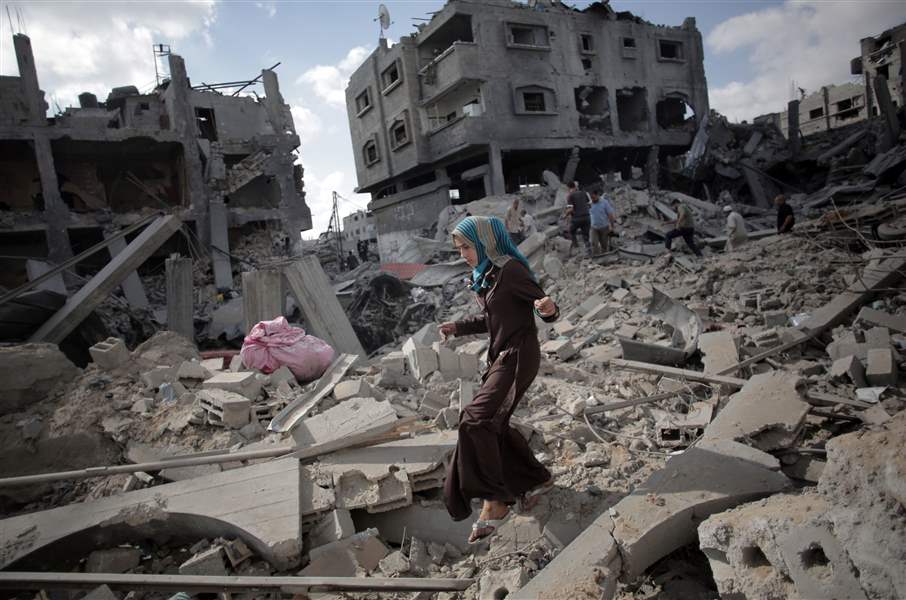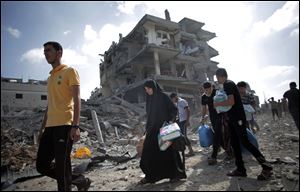
Israel says it's extending Gaza truce for 24 hours
Israel agrees to extend Gaza war truce for 24 hours, but says it will respond to Hamas fire
7/26/2014
A Palestinian woman inspects the damage of her destroyed house during a 12-hour cease-fire in Gaza City's Shijaiyah neighborhood, Saturday, July 26, 2014. Gaza residents used a 12-hour humanitarian cease-fire on Saturday to stock up on supplies and survey the devastation from nearly three weeks of fighting, as they braced for a resumption of Israel's war on Hamas amid stalled efforts to secure a longer truce. (AP Photo/Khalil Hamra)
ASSOCIATED PRESS

Palestinians pass by destroyed houses after they salvage usable things in their belongings found at their destroyed houses during a 12-hour cease-fire in Gaza City's Shijaiyah neighborhood, Saturday, July 26, 2014.
BEIT HANOUN, Gaza Strip — Hamas resumed rocket fire Saturday on Israel after rejecting Israel’s offer to extend a humanitarian cease-fire, the latest setback in international efforts to negotiate an end to the Gaza war.
Despite the Hamas rejection, Israel’s Cabinet decided to extend a truce for 24 hours, until midnight (2100 GMT) Sunday. However, it warned that its military would respond to any fire from Gaza and would continue to demolish Hamas military tunnels during this period.
A temporary lull on Saturday saw Palestinians return to neighborhoods reduced to rubble and allowed medics to collect close to 150 bodies, Palestinian health official Ashraf al-Kidra.
With the retrieval of the corpses, the number of Palestinians killed reached 1,047 in 19 days of fighting, while more than 6,000 were wounded, he said.
U.S. Secretary of State John Kerry and European foreign ministers, meeting in Paris, had hoped to transform the cease-fire into a more sustainable truce. That effort was thrown into doubt with the Hamas’ rejection of the extension.
Hamas spokesman Sami Abu Zuhri said any truce must include a withdrawal of Israeli forces from Gaza, and that tens of thousands of displaced people must be allowed to return to their homes. Israel’s current terms are “not acceptable,” he said in a text message to journalists.
In the northern Gaza town of Beit Hanoun, scores of homes had been pulverized, wreckage blocked roads and power cables dangled in the streets. Hardest-hit were areas close to the border with Israel, areas from where Gaza militants typically fire rockets.
Manal Kefarneh, 30, wept as she inspected her damaged home.
On an unfinished top floor, she and her husband had been raising chickens. The couple collected those dead and replenished water for the living in hopes they will survive the war.
“What did we do to deserve this?” she asked. “All of the Arab leaders watch what’s going on here like it’s a Bollywood film.”
Israeli strikes have destroyed hundreds of homes, including close to 500 in targeted hits, and forced tens of thousands of people to flee, according to Palestinian rights groups.
Across Gaza, 147 bodies were pulled from the rubble Saturday, officials said. In southern Gaza, a tank shell killed 20 members of an extended family who sought refuge inside a building, al-Kidra said.
Israel says it is doing its utmost to prevent civilian casualties, including sending evacuation warnings to residents in targeted areas, and blames Hamas for putting civilians in harm’s way.
Israel has lost 42 soldiers and two civilians, and a Thai worker also has been killed.
Israeli legislator Ofer Shelah of the centrist Yesh Atid party said Israeli troops are “fighting with an enemy dug in within the civilian population, dug in underground or within the houses there.” Referring to the widespread destruction, he said that “those are the consequences of such a fight.”
The military took some Israeli journalists into the Gaza border areas where troops were operating. Footage broadcast on Israeli television station Channel 10 showed homes booby-trapped with explosives, as well as grenades, mines and rockets stored there. Tunnels opened up inside houses.
Soldiers said some buildings blew up after being hit by gunfire from all the explosives inside. Col. Ofer Vinter, head of the Givati infantry brigade, said almost every house was booby-trapped with explosives and that Gaza fighters “emerge from the ground all the time.”
Standing over a tunnel concealed in a house, he said: “We cannot leave here before we finish dealing with all the tunnels.”
Israel launched a major air campaign in Gaza on July 8 and later sent ground troops into the Hamas-ruled territory in an operation it said was aimed at halting Palestinian rocket fire and destroying cross-border tunnels it views as a threat.
Shelah, the legislator, said about 50 tunnels have been discovered so far.
On Friday, Israel rejected a Kerry proposal for a weeklong truce because it had no provisions for the Israeli military continuing to demolish tunnels, Israeli media reported at the time.
Under the Kerry proposal, talks would begin during the temporary truce on easing the border blockade of Hamas-ruled Gaza.
Hamas has said it would not halt fire until it wins guarantees that the border blockade, enforced by Israel and Egypt, would be lifted.
Any new border arrangements for Gaza would likely give a role to Western-backed Palestinian President Mahmoud Abbas, the main political rival of Hamas. Hamas had seized Gaza from Abbas in 2007, triggering the Gaza blockade by Israel and Egypt.
However, Abbas, who heads the West Bank-based Palestinian Authority, reached a power-sharing deal earlier this year with Hamas. Under the deal, a government of technocrats headed by Abbas was to prepare for new elections in the West Bank and Gaza.
Egypt wants forces loyal to Abbas to be posted on the Gaza side of the mutual border before considering open the Rafah crossing there, Gaza’s main gate to the world. Hamas officials have said they do not oppose such an arrangement, but would not surrender control over its thousands-strong security forces, meaning Hamas would remain the de facto power in Gaza.
French Foreign Minister Laurent Fabius said in Paris on Saturday that he and his counterparts from other nations are calling on both sides to negotiate a sustainable cease-fire.
Such a truce should meet Israeli security concerns, but also “the Palestinians’ expectations in terms of economic development and access to Gaza,” he said. “We are convinced of the need to involve the Palestinian Authority in achieving these objectives.”
Israel initially decided to extend Saturday’s 12-hour truce by four hours, to midnight (2100 GMT) Saturday. Hamas swiftly rejected the idea of an extension.
Shortly after the Hamas announcement, Gaza militants fired eight rockets and three mortars at Israel, the military said. Gaza militants said they fired 42 rockets, including two that were aimed at Tel Aviv, Israel’s second largest city, where police dispersed a peace rally attended by several thousand people.
In Gaza, a 36-year-old Palestinian man was killed by a sniper near the central Gaza town of Deir el-Balah shortly after the 12-hour truce ended.
Meanwhile, anger over Israel’s Gaza operation has sparked a series of protests in the West Bank. Since Thursday, nine Palestinians have been killed in clashes between Israeli forces and Palestinians protesters.
Among those were two Palestinians killed by army fire Saturday, including a 23-year-old in the town of Jenin and a 16-year-old near the town of Bethlehem, hospital officials said.